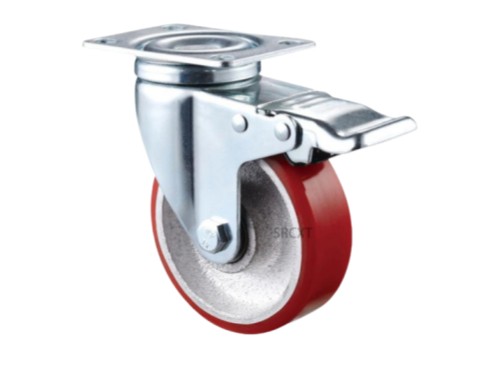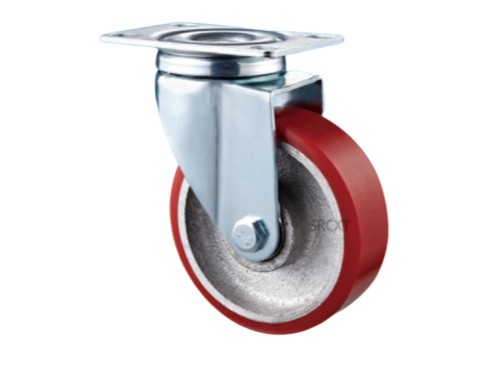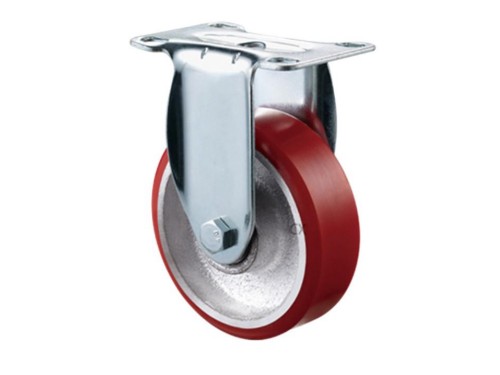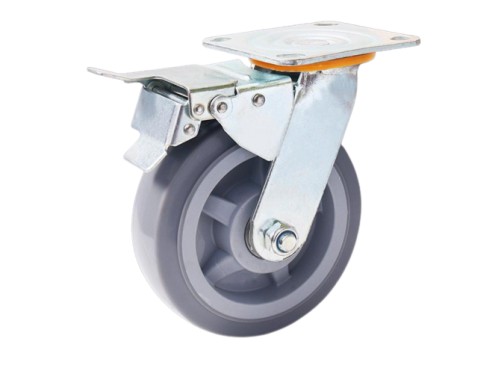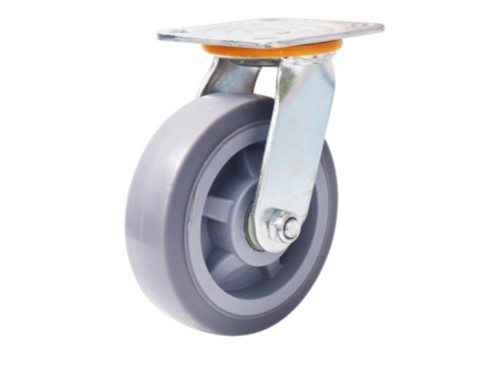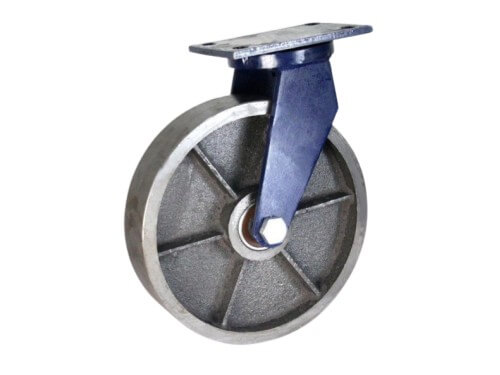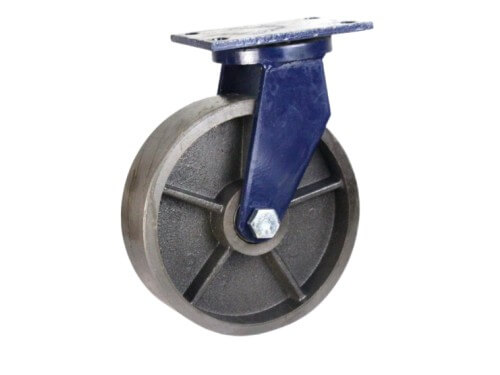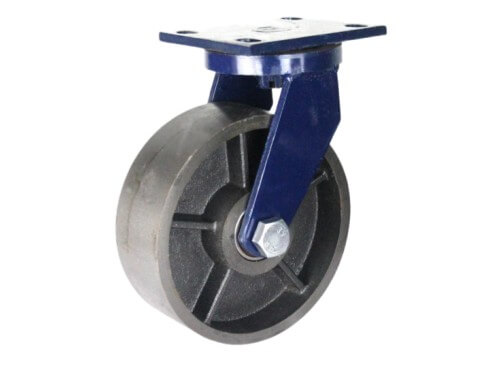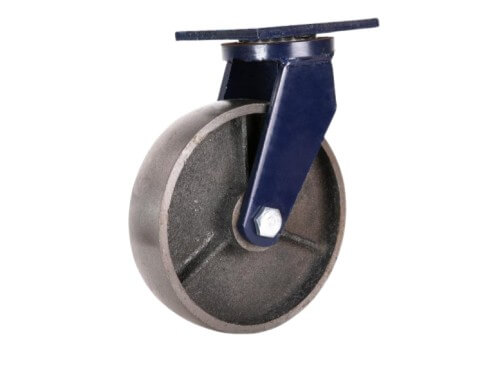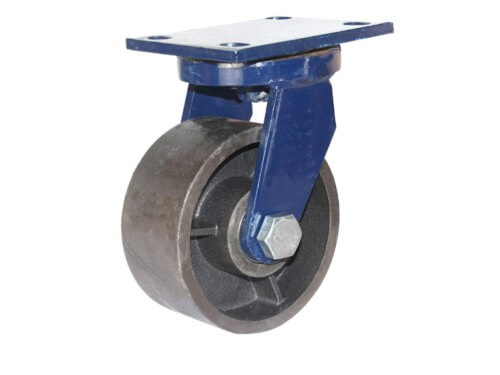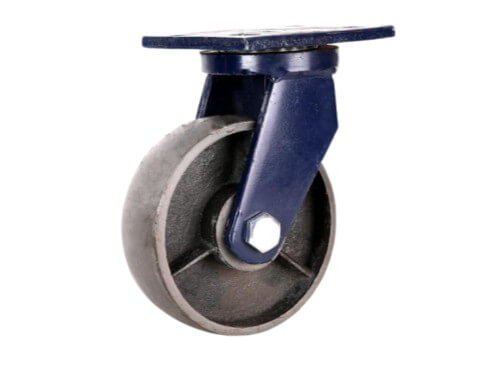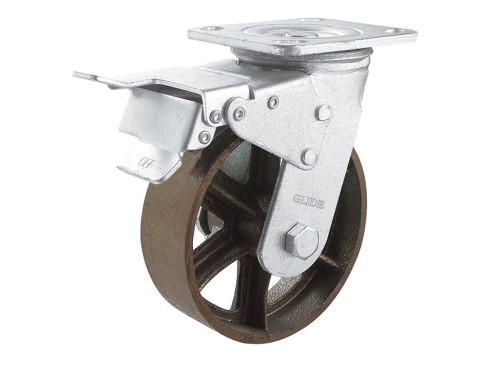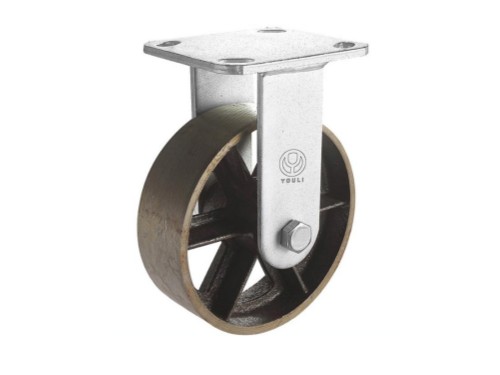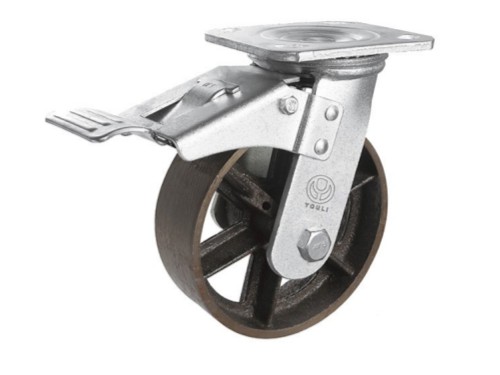Trolley Wheels
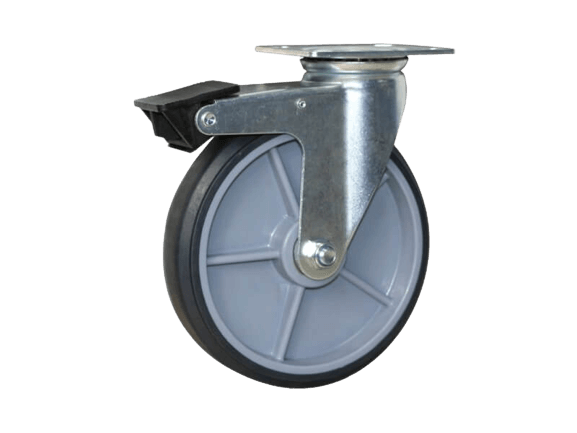
Trolley wheels are wheels that are used on trolleys, which are carts or small vehicles used for carrying goods or materials. Trolley wheels come in a range of sizes and can be made from different materials, such as rubber, polyurethane, or metal. They may have either solid or pneumatic tires, and may have different types of bearings to allow them to turn smoothly. Trolley wheels have a maximum load capacity, which is the maximum amount of weight they can safely support. Some trolley wheels may also have brakes to help the trolley stop or slow down. Trolley wheels are used in a variety of applications, including hand trolleys, luggage trolleys, shopping trolleys, industrial trolleys, medical trolleys, and platform trolleys.
What Regular Trolley Wheels Do We Supply?
-
Trolley Wheels
5” Top Plate PU Iron Core Trolley Wheels (130kg)
-
Trolley Wheels
4” Top Plate PU Iron Core Trolley Wheels (100kg)
-
Trolley Wheels
3” Top Plate PU Iron Core Trolley Wheels (80kg)
-
Trolley Wheels
8” Top Plate Rubber Trolley Wheels (250kg)
-
Trolley Wheels
6” Top Plate Rubber Trolley Wheels (250kg)
-
Trolley Wheels
5” Top Plate Rubber Trolley Wheels (250kg)
-
Trolley Wheels
4” Top Plate Rubber Trolley Wheels (250kg)
-
Trolley Wheels
12” Top Plate Cast Iron Trolley Wheels (3000kg)
-
Trolley Wheels
10” Top Plate Cast Iron Trolley Wheels (2000kg)
-
Trolley Wheels
8” Top Plate Cast Iron Trolley Wheels (1500kg)
-
Trolley Wheels
8” Top Plate Cast Iron Trolley Wheels (1000kg)
-
Trolley Wheels
6” Top Plate Cast Iron Trolley Wheels (1200kg)
-
Trolley Wheels
6” Top Plate Cast Iron Trolley Wheels (700kg)
-
Trolley Wheels
8” Top Plate Cast Iron Trolley Wheels (480kg)
-
Trolley Wheels
6” Top Plate Cast Iron Trolley Wheels (420kg)
-
Trolley Wheels
5” Top Plate Cast Iron Trolley Wheels (360kg)
Features:
Trolley wheels are wheels that are used on trolleys, which are carts or small vehicles used for carrying goods or materials. The features of trolley wheels may vary depending on the specific application and design of the trolley, but some common features of trolley wheels include:
Size: Trolley wheels come in a range of sizes, with larger wheels generally being able to handle more weight and terrain better than smaller wheels.
Material: Trolley wheels can be made from a variety of materials, including rubber, polyurethane, and metal. The material used can affect the durability and performance of the wheels.
Type of tire: Trolley wheels can have either solid or pneumatic (inflatable) tires. Solid tires are more durable and require less maintenance, but may not provide as smooth a ride as pneumatic tires.
Bearing Type: Trolley wheels may have different types of bearings, such as ball bearings or roller bearings, to allow them to turn smoothly.
Load capacity: Trolley wheels have a maximum load capacity, which is the maximum amount of weight they can safely support. It is important to choose trolley wheels with a load capacity that is appropriate for the weight of the goods being carried.
Brake type: Some trolley wheels may have brakes to help the trolley stop or slow down. Brakes can be either mechanical or electrical, and may be activated by a lever or button.
Applications:
Trolley wheels are used on a wide range of carts and small vehicles for carrying goods or materials. Some common applications for trolley wheels include:
Hand trolleys: Hand trolleys, also known as hand trucks or dollies, are small carts with handles that can be used to move boxes, furniture, and other items. Hand trolleys often have two or four trolley wheels.
Luggage trolleys: Luggage trolleys are carts with handles that are used to transport luggage in airports, hotels, and other locations. Luggage trolleys usually have four trolley wheels.
Shopping trolleys: Shopping trolleys are carts that are used in supermarkets and other retail stores to hold and transport groceries and other items. Shopping trolleys often have four trolley wheels.
Industrial trolleys: Industrial trolleys are carts that are used in warehouses, factories, and other industrial settings to transport goods and materials. Industrial trolleys can have two, four, or more trolley wheels depending on the size and weight of the items being carried.
Medical trolleys: Medical trolleys are carts that are used in hospitals and other healthcare settings to transport medical equipment, supplies, and medication. Medical trolleys usually have four trolley wheels.
Platform trolleys: Platform trolleys are flat carts that are used to transport large or heavy items. Platform trolleys often have four or more trolley wheels.
How to choose the Trolley Wheels?
When choosing trolley wheels, there are several factors to consider:
Load capacity: Make sure to choose trolley wheels with a load capacity that is appropriate for the weight of the goods being carried. Overloading the trolley wheels can cause them to fail or break, which can be dangerous.
Material: Consider the material of the trolley wheels. Rubber and polyurethane wheels are often quieter and more durable than metal wheels, but may not be suitable for heavy loads or rough terrain. Metal wheels are more durable and can handle heavy loads, but may be noisier and less comfortable to use.
Size: Larger trolley wheels are generally able to handle more weight and terrain better than smaller wheels. However, larger wheels may also be more difficult to maneuver in tight spaces.
Tire type: Solid tires are more durable and require less maintenance than pneumatic tires, but may not provide as smooth a ride. Pneumatic tires provide a smoother ride, but may puncture or go flat more easily.
Bearing Type: Choose trolley wheels with good quality bearings to ensure smooth and easy movement. Ball bearings and roller bearings are common types of bearings used in trolley wheels.
Brake type: If you need to stop or slow down the trolley, consider choosing trolley wheels with brakes. Brakes can be either mechanical or electrical, and may be activated by a lever or button.
FAQs for the Trolley Wheels?
Here are some common questions and answers about trolley wheels:
Q: What are the most common materials used for trolley wheels?
A: Trolley wheels can be made from a variety of materials, including rubber, polyurethane, and metal. Rubber and polyurethane wheels are often quieter and more durable than metal wheels, but may not be suitable for heavy loads or rough terrain. Metal wheels are more durable and can handle heavy loads, but may be noisier and less comfortable to use.
Q: What is the difference between solid and pneumatic trolley wheels?
A: Solid trolley wheels are made from a solid material, such as rubber or polyurethane, and do not have an air chamber. They are more durable and require less maintenance than pneumatic wheels, but may not provide as smooth a ride. Pneumatic trolley wheels are inflatable and have an air chamber, which allows them to absorb shock and provide a smoother ride. However, they are more prone to punctures and may need to be refilled with air periodically.
Q: How do I know if the trolley wheels I am considering are suitable for my needs?
A: When choosing trolley wheels, consider the load capacity, material, size, tire type, bearing type, and brake type that are most suitable for your needs. Make sure to choose trolley wheels with a load capacity that is appropriate for the weight of the goods being carried, and consider the terrain and conditions in which the trolley will be used.
Q: Can trolley wheels be replaced or upgraded?
A: Yes, trolley wheels can be replaced or upgraded if they become worn out or if you want to improve the performance of the trolley. When replacing or upgrading trolley wheels, make sure to choose wheels that are compatible with the trolley and are suitable for your needs.
Q: Are there any maintenance requirements for trolley wheels?
A: The maintenance requirements for trolley wheels may vary depending on the material and type of tire. Solid trolley wheels generally require less maintenance than pneumatic wheels, which may need to be refilled with air periodically. In general, it is a good idea to periodically check the trolley wheels for wear and damage, and to clean and lubricate the bearings as needed to ensure smooth operation.
Start working with us today to make your trolley wheels business more profitable!
We are here for all your business needs and questions.

